
Journal of Energy in Southern Africa
Scope & Guideline
Empowering Energy Research for Southern Africa's Future
Introduction
Aims and Scopes
- Sustainable Energy Solutions:
Research on renewable energy sources such as solar, wind, and biomass, focusing on their integration into existing energy systems and their potential to meet regional energy needs. - Energy Policy and Regulation:
Analysis of energy policies, regulations, and their impacts on energy production and consumption, particularly in Southern Africa, addressing issues like energy access and economic viability. - Socio-Economic Impacts of Energy Systems:
Investigating the social and economic dimensions of energy use, including household energy choices, the role of energy in economic development, and the impacts of energy projects on local communities. - Technological Innovation in Energy:
Exploration of emerging technologies in the energy sector, including thermoelectric generators, heat pumps, and hybrid systems, aimed at enhancing energy efficiency and reliability. - Climate Change and Energy Transition:
Studies that examine the relationship between energy systems and climate change, including adaptation and mitigation strategies related to energy production and consumption.
Trending and Emerging
- Hybrid Renewable Energy Systems:
A growing focus on hybrid systems that combine multiple renewable energy sources, enhancing reliability and efficiency in energy supply, particularly in rural and underserved communities. - Socioeconomic Factors in Energy Adoption:
Research increasingly addresses the socio-economic determinants influencing energy choices, highlighting the importance of understanding community needs and behaviors in adopting new technologies. - Green Hydrogen Production:
Emerging interest in green hydrogen as a clean energy carrier, with studies exploring its production from local resources, such as agricultural waste, to promote sustainable energy practices. - Climate Resilience and Adaptation Strategies:
An emphasis on integrating climate resilience into energy planning, with research focusing on how energy systems can adapt to changing climate conditions and mitigate associated risks. - Data-Driven Energy Management:
The use of advanced modeling and data analytics to optimize energy systems and predict performance, reflecting the impact of the Fourth Industrial Revolution on the energy sector.
Declining or Waning
- Traditional Fossil Fuel Reliance:
There is a noticeable decline in research focusing on traditional fossil fuel-based energy systems, as the journal increasingly emphasizes renewable energy and sustainable alternatives. - Large-scale Centralized Energy Systems:
Research on centralized energy generation systems is waning, possibly due to a growing interest in decentralized and community-based energy solutions that enhance local energy resilience. - Conventional Economic Analyses of Energy Markets:
Studies employing traditional economic frameworks to analyze energy markets are less frequent, indicating a shift towards integrated approaches that consider socio-economic and environmental factors. - Single Technology Focus Studies:
Papers that concentrate solely on one technology without considering interdisciplinary implications are becoming less common, as the journal moves towards more holistic and integrated energy system assessments.
Similar Journals
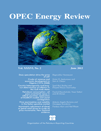
OPEC Energy Review
Illuminating Trends in Energy Policy and EconomicsOPEC Energy Review, published by Wiley, is a leading journal dedicated to advancing knowledge in the fields of economics and energy studies. With its ISSN 1753-0229 and E-ISSN 1753-0237, this journal serves as a vital resource for researchers, professionals, and students interested in the dynamic interplay between energy policies, market trends, and economic frameworks. Positioned in the Q3 tier for both Economics and Econometrics and Energy (miscellaneous) categories as of 2023, the journal highlights its commitment to addressing contemporary issues in energy economics. The OPEC Energy Review aims to foster scholarly dialogue through rigorous peer-reviewed articles and comprehensive analyses, contributing to the understanding of global energy markets and their economic implications. For anyone looking to delve deeper into energy economics, this journal stands as a key platform for innovative research, fostering a well-rounded view of current challenges and opportunities in the sector.

Journal of Power Technologies
Exploring Cutting-Edge Power SolutionsJournal of Power Technologies is a prestigious academic journal dedicated to advancing the field of power engineering, specifically focusing on innovative technologies and methodologies related to energy production, transmission, and efficiency. Published by the renowned Warsaw University of Technology, Institute of Heat Engineering, this journal is committed to disseminating high-quality research that addresses the challenges and opportunities in the energy sector. Although currently not open access, the journal provides extensive subscription options for access to its comprehensive range of articles. With an emphasis on original research, case studies, and reviews, the Journal of Power Technologies serves as a vital resource for researchers, practitioners, and students alike, aiming to shape the future of sustainable power systems and contribute significantly to the global energy discourse. The journal continues to foster an academic environment where innovation in power technology is highlighted and celebrated, supporting the ongoing quest for sustainable energy solutions.
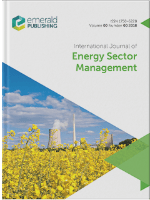
International Journal of Energy Sector Management
Elevating Discourse on Sustainable Energy Solutions.Welcome to the International Journal of Energy Sector Management, a distinguished platform dedicated to advancing knowledge in the critical intersection of energy and management. Published by Emerald Group Publishing Ltd., this peer-reviewed journal, with an ISSN of 1750-6220 and E-ISSN 1750-6239, offers a unique forum for researchers, professionals, and students to share insights and experiences in energy sector management. With a commendable Q2 ranking in both the Energy (miscellaneous) and Strategy and Management categories, as well as a strong presence in Scopus rankings, this journal is pivotal for those looking to understand the complexities of energy systems and their management strategies from 2007 to 2024. By fostering open discourse on innovative practices, sustainability efforts, and policy implications, the International Journal of Energy Sector Management serves as an essential resource for anyone dedicated to shaping the future of energy management.
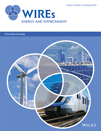
Wiley Interdisciplinary Reviews-Energy and Environment
Fostering interdisciplinary collaboration for a better world.Wiley Interdisciplinary Reviews: Energy and Environment, published by Wiley Periodicals, Inc., stands as a leading platform for interdisciplinary research at the intersection of energy and environmental sciences. With a commendable impact factor and prestigious rankings—Q1 in both Environmental Science and Renewable Energy, Sustainability and the Environment—the journal has solidified its position in the academic community, ranked #22 out of 233 in General Environmental Science and #46 out of 270 in Renewable Energy. This journal aims to advance understanding and foster innovative solutions to pressing global challenges such as climate change, energy efficiency, and sustainability issues. Researchers and professionals alike are encouraged to explore the journal’s extensive range of articles, which contribute to a significant body of knowledge and support informed decision-making in policy and practice. Please note that the journal is not open access, providing content through institutional subscriptions and individual purchase options. Operating from its base in the United Kingdom, the journal maintains an impressive convergence of knowledge from 2012 to 2024, encouraging contributions from a diverse range of disciplines to address critical energy and environmental challenges.

Frontiers in Energy
Leading the Charge in Energy Research and Development.Frontiers in Energy is a distinguished journal published by HIGHER EDUCATION PRESS, focusing on the dynamic and rapidly evolving field of energy engineering and power technology. Established in 2011, the journal serves as a pivotal platform for disseminating innovative research findings and practical applications that address critical challenges in energy systems. With an impressive Q2 ranking in 2023 and a Scopus rank of 81 out of 272 in the discipline, it highlights the journal's influential impact within the academic community, reflecting its commitment to high-quality research. Based in Beijing, China, the journal aims to promote open and accessible scientific discussion, facilitating collaboration among researchers, professionals, and students alike. As an open access publication, Frontiers in Energy ensures that valuable knowledge is readily available to a global audience, effectively contributing to advancements in sustainable energy solutions. Join the forefront of energy innovation by engaging with cutting-edge research that shapes our energy future.
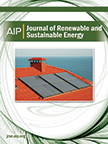
Journal of Renewable and Sustainable Energy
Shaping Sustainable Futures Through ResearchThe Journal of Renewable and Sustainable Energy, published by AIP Publishing, stands at the forefront of research in the fields of renewable energy and sustainable practices. With an ISSN of 1941-7012, this journal aims to foster innovative research and exchange of knowledge on sustainable technologies and methodologies that contribute to environmental conservation and energy efficiency. Achieving a prestigious Q2 ranking in the category of Renewable Energy, Sustainability, and the Environment, it ranks 135 out of 270 journals in Scopus, signifying its impactful contributions to the field. The journal, active from 2010 to 2024, provides a platform for authors, analysts, and practitioners to disseminate significant findings that can shape future environmental policies and energy frameworks. Although not currently an Open Access publication, it remains an essential resource for researchers dedicated to advancing sustainable development and energy solutions.
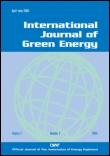
International Journal of Green Energy
Empowering knowledge for a sustainable tomorrow.The International Journal of Green Energy is a premier publication that plays a pivotal role in the field of renewable energy and sustainability. Published by Taylor & Francis Inc, this journal, with ISSN 1543-5075 and E-ISSN 1543-5083, has established itself as a crucial platform for sharing innovative research and developments from 2005 to 2024. With a commendable Q2 ranking in the category of Renewable Energy, Sustainability and the Environment, it ranks 100 out of 270 in Scopus, positioning itself in the 63rd percentile of its field. The journal is dedicated to advancing knowledge and fostering dialogue around green technologies and sustainable practices, providing invaluable insights for researchers, industry professionals, and students alike. Although it does not offer open access options, the journal's commitment to rigorous peer review ensures that only high-quality research is published, making it an essential resource for those seeking to explore and understand the complexities of green energy solutions.

Problemele Energeticii Regionale
Empowering Energy Solutions for TomorrowProblemele Energeticii Regionale is a notable academic journal focused on the field of energy engineering and sustainable energy solutions, published by the Institute of Power Engineering, Academy of Sciences of Moldova. Since its inception in 2005, this Open Access journal has become a significant platform for disseminating research and innovations in various energy-related domains, including renewable solutions, fuel technology, and energy sustainability. While its impact factor metrics suggest it currently resides in the Q4 quartile category across multiple scopes—such as Energy Engineering, Power Technology, and Renewable Energy—it provides critical insights that can pave the way for advancements in regional energy challenges. Researchers, professionals, and students alike will find this journal an essential resource for understanding and contributing to the ongoing discourse in the energy sector. With its commitment to accessibility and knowledge sharing, Problemele Energeticii Regionale aims to foster a collaborative and informed community focused on energy innovation and sustainability.

Energy Storage
Exploring Breakthroughs in Energy Storage TechnologiesEnergy Storage, published by WILEY, is a pivotal journal dedicated to the rapidly evolving field of energy storage technologies. Since its inception in 2019, the journal has established a significant platform for researchers and professionals by providing insightful articles that explore innovations and advancements in energy engineering and renewable energy systems. With an Impact Factor positioning it in the Q3 category for both Energy Engineering and Power Technology and Renewable Energy, Sustainability, and the Environment, Energy Storage plays a crucial role in disseminating knowledge that addresses global energy challenges. The journal is indexed in Scopus, showcasing its commitment to high-quality research, providing valuable contributions to the community including engaging studies and practical applications aimed at sustainable energy solutions. For those passionate about the future of energy, Energy Storage represents an essential resource for staying informed and connected within this dynamic and interdisciplinary field.
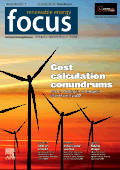
Renewable Energy Focus
Empowering Sustainable Solutions for a Greener TomorrowRenewable Energy Focus is a premier journal published by Elsevier, dedicated to advancing the field of renewable energy and sustainability. With an ISSN of 1755-0084 and an E-ISSN of 1878-0229, this journal serves as a vital platform for researchers, professionals, and students interested in innovative solutions to energy challenges. Established in 2007, the journal has evolved to become a recognized authority in the subject area, currently ranked in the Q2 quartile of its category for 2023, emphasizing its significance in promoting impactful research. The journal encompasses a wide range of topics, including solar, wind, bioenergy, and sustainable practices that contribute to environmental conservation and energy efficiency. As part of Elsevier's commitment to disseminating high-quality research, Renewable Energy Focus is indexed in Scopus, currently holding a rank of #92/270 in the energy sector, positioning it in the 66th percentile of its field. This journal offers an essential resource for those dedicated to fostering sustainable energy solutions.